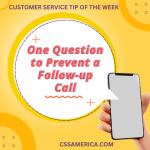In the Healthcare Leaders Media article titled “Editor’s Note: Patient Satisfaction on the Rise,” a New England Journal of Medicine article is referenced since it noted that patients feel that the non-clinical experience is “twice as important as the hospital’s clinical reputation.” In other words, patients feel that the level of clinical care is less important than the other aspects of the experience such as customer service, communications, timeliness, processes, etc.
While I wasn’t surprised at the findings (we’ve discussed it on this blog previously), what is surprising is that the author seemed to say that this fact is actually a concern. He stated that healthcare organizations need to essentially educate the patients on healthcare quality so that they understand the greater importance of and distinctions of quality clinical care in comparison to the non-clinical experience.
Let’s look at this a different way. Let’s say that customers prefer Google over your search engine because it’s faster and easier than yours. But you feel that your search engine has prettier colors on the home page. So your approach is to educate Google customers that they need to view the colors on the home page as more important than the speed or ease of use of a search engine.
Huh?
Companies that want to retain customers will be metaphorically banging their heads against the walls if they strive to change what the customer feels is most important. The customer decides what they care about, what they feel is most important.
It’s then up to you and me to be as great as possible at delivering what the customer feels is important.
So is patient satisfaction more important than clinical care? The answer: Whatever the customer feels is most important is most important.
Don’t tell the customer what they care about isn’t that important. That’s an EASY way to lose a customer.
Read our New Book – “Ask Yourself…Am I GREAT at Customer Service?” http://www.amigreatat.com/
Interested in improving your company’s customer service? See more at our new website! http://www.cssamerica.com/





















